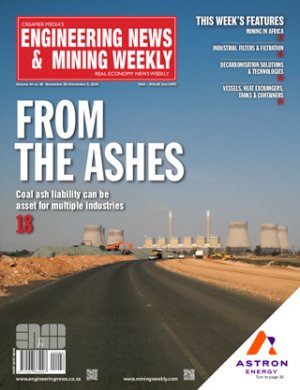Chinese miners Zhejiang Huayou Cobalt and Tsingshan Holding Group are defying low lithium prices to develop a deposit of the battery metal with a Zimbabwean state company.
The two firms already operate lithium projects in the southern African country and will complete a study before building a mine and processing plant at Sandawana, in the country’s south, according to the chief executive officer of Kuvimba Mining House, the State-owned firm that owns the asset. Kuvimba had announced the deal in July, without naming the partners.
Although tumbling lithium spot prices – down almost 90% since late 2022 – have triggered some production shutdowns and deferrals around the world, Chinese companies continue to look for feedstock to supply refineries at home.
Huayou and Tsingshan’s construction plans would cost $250-million to $300-million and produce about 500 000 t/y of lithium concentrate, Kuvimba’s acting CEO, Trevor Barnard, said in an interview, citing a previous study. The companies are finalizing the price tag and output capacity in a more comprehensive feasibility study due to be completed within three months, he said.
Prices for the battery material will likely pick up slowly in the next year before recovering strongly from 2026 and 2027 as production surpluses give way to deficits, Barnard said. Despite that, “our economics show to us that we will still be a profitable business even at the current pricing levels,” he said.
Huayou and Tsingshan didn’t respond to request for comments.
Zimbabwe has emerged as a significant producer of lithium in the last two years after a spike in prices through 2021 and 2022 fueled a wave of transactions by Chinese firms, including Chengxin Lithium Group Co. Ltd. and Sinomine Resource Group Co. Ltd. A Huayou unit has invested more than $700-million to buy and build the Arcadia mine, while Tsingshan has developed the smaller Gwanda project.
The country will account for about 10% of global mined supply this year, according to CRU Group.
A manufacturer of battery materials, Huayou also owns cobalt projects in the Democratic Republic of Congo and produces nickel in Indonesia. Tsingshan, the world’s top producer of stainless steel and nickel with a new steelworks in Zimbabwe, is expanding its presence in lithium mining and has a subsidiary that makes batteries for electric vehicles.
Instead of owning equity in Sandawana, Barnard said Huayou and Tsingshan have agreed to transfer the asset back to Kuvimba after a minimum of five years and recouping the loan that will finance the project. The terms of an offtake contract with the two companies are still under negotiation, according to the CEO.
Sandawana was the site of a moth-balled emerald mine that Rio Tinto ran for several decades last century. More recently, Zimbabwe has sought to find iron ore and tantalum at the site before turning their attentions to lithium.
Kuvimba, which has divided Sandawana into three blocks, is discussing two other earlier-stage projects that require further exploration with potential investors, including a firm belonging to British businessman Algy Cluff, who helped pioneer the North Sea oil and gas industry and has run mining projects in African countries including Zimbabwe.
Edited by: Bloomberg
EMAIL THIS ARTICLE SAVE THIS ARTICLE
To subscribe email subscriptions@creamermedia.co.za or click here
To advertise email advertising@creamermedia.co.za or click here










